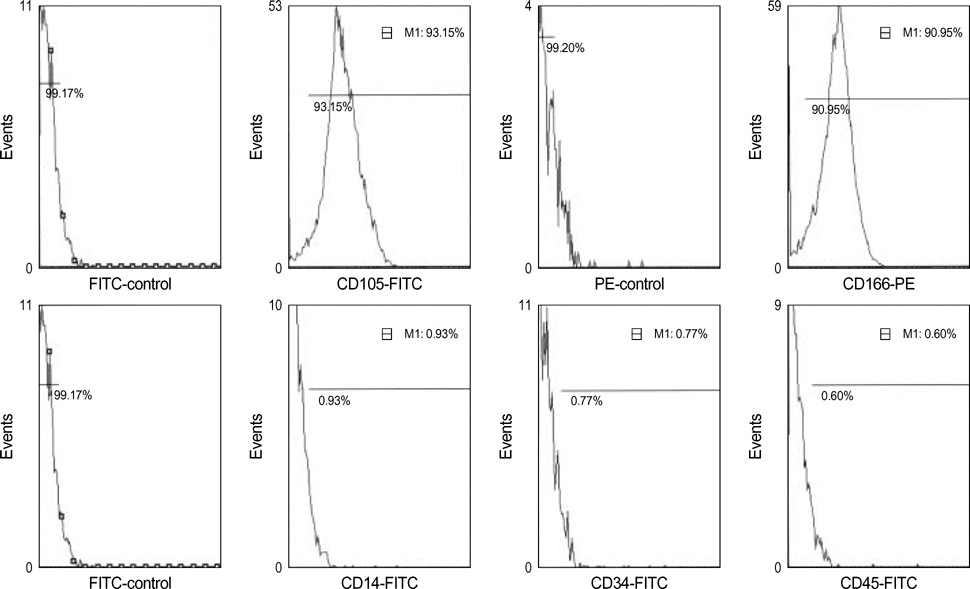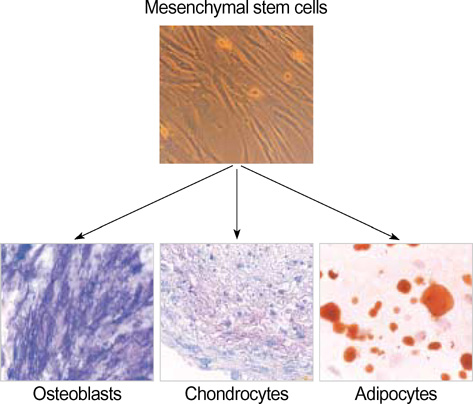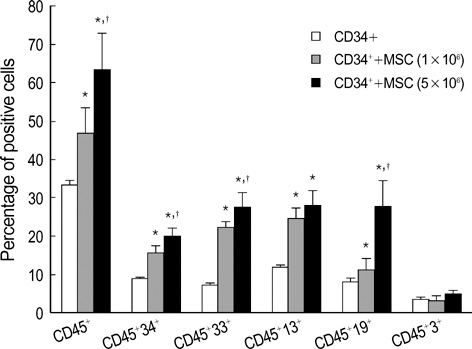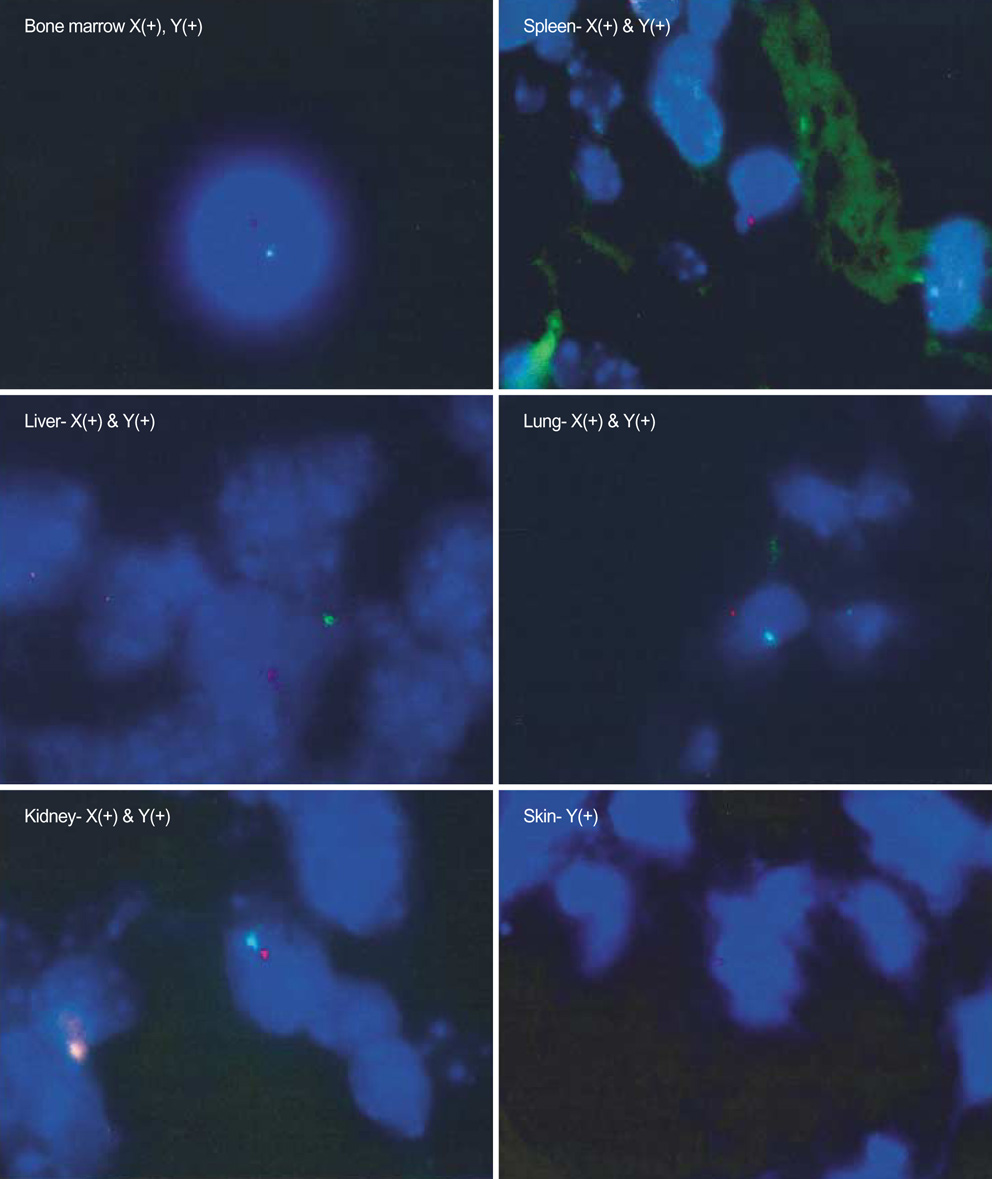J Korean Med Sci.
2007 Jun;22(3):412-419. 10.3346/jkms.2007.22.3.412.
Co-transplantation of Human Mesenchymal Stem Cells Promotes Human CD34+ Cells Engraftment in a Dose-dependent Fashion in NOD/SCID Mice
- Affiliations
-
- 1Division of Hematology-Oncology, Soon Chun Hyang University Hospital, 657-58 Hannam-dong, Yongsan-gu, Seoul, Korea. jhwon@hosp.sch.ac.kr
- 2Department of Laboratory Medicine, Soon Chun Hyang University College of Medicine, Seoul, Korea.
- 3Department of Pediatrics, The Catholic University of Korea College of Medicine, Seoul, Korea.
- 4Research Institute, Pharmicell Inc., Seoul, Korea.
- KMID: 1778346
- DOI: http://doi.org/10.3346/jkms.2007.22.3.412
Abstract
- Mesenchymal stem cells (MSCs) have recently been identified and characterized in humans. Moreover, MSC secrete cytokines that can support hematopoietic progenitor growth. In the present study, we evaluated whether the efficacy of hematopoietic stem cell transplantation is improved by their co-transplantation with MSC, and whether this is positively correlated with the dose of infused MSCs. Accordingly, irradiated NOD/SCID mice were transplanted with 1x10(5) human CD34+ cells in the presence or absence of culture expanded MSCs (1x10(6) or 5x10(6)). We evaluated human hematopoietic cell engraftment by flow cytometry and assessed MSC tissue distributions by fluorescence in situ hybridization. We found that CD45+ and CD34+ cell levels were significantly elevated in a dose-dependent manner in cotransplanted mice 4 weeks after transplantation. The engraftments of CD33+ and CD19+ cells also increased dose-dependently. However, the engraftment of CD3+ cells did not increase after co-transplantation with MSCs. Human Y chromosome+ cells were observed in multiple tissues and were more frequently observed in mice co-transplanted with 5x10(6) rather than 1x10(6) MSCs. These results suggest that MSCs are capable of enhancing hematopoietic cell engraftment and distribution in multiple organs in a dose-dependent fashion.
MeSH Terms
-
Animals
Antigens, CD34/*biosynthesis
Cell Differentiation
Cells, Cultured
Dose-Response Relationship, Drug
Female
Fetal Blood/*metabolism
Humans
In Situ Hybridization, Fluorescence
Mesenchymal Stem Cells/*cytology
Mice
Mice, Inbred NOD
Mice, SCID
Microscopy, Fluorescence/methods
Stem Cell Transplantation/*methods
Figure
Cited by 2 articles
-
Cord Blood - Current Status and Perspective
Young-Ho Lee
Korean J Hematol. 2007;42(3):181-196. doi: 10.5045/kjh.2007.42.3.181.Usefulness of Umbilical Cord Blood Cells in Era of Hematopoiesis Research
Seong-Kyu Park, Jong-Ho Won
Int J Stem Cells. 2009;2(2):90-96.
Reference
-
1. Pitterger MK, Mackay AM, Beck SC, Jaiswal RK, Douglas R, Mosca JD, Moorman MA, Simonetti DW, Craig S, Marshak DR. Multilineage potential of adult human mesenchymal stem cells. Science. 1999. 284:143–147.2. Jiang Y, Jahagirdar BN, Reinhardt RL, Schwartz RE, Keene CD, Ortiz-Gonzalez XR, Reyes M, Lenvik T, Lund T, Blackstad M, Du J, Aldrich S, Lisberg A, Low WC, Largaespada DA, Verfaillie CM. Pluripotency of mesenchymal stem cells derived from adult marrow. Nature. 2002. 418:41–49.
Article3. Deans RJ, Moseley AB. Mesenchymal stem cells; biology and potential clinical uses. Exp Hematol. 2000. 28:875–884.4. Koc ON, Lazarus HM. Mesenchymal stem cells: heading into clinic. Bone Marrow Transplant. 2001. 27:235–239.5. Majumdar MK, Thiede MA, Mosca JD, Moorman M, Gerson SL. Phenotype and functional comparison of cultures of marrow-derived mesenchymal stem cells (MSCs) and stromal cells. J Cell Physiol. 1998. 176:57–66.6. Prockop DJ. Marrow stromal cells as stem cells for nonhematopoietic tissues. Science. 1997. 276:71–74.
Article7. Liechty KW, MacKenzie TC, Shaaban AF, Radu A, Moseley AB, Deans R, Marshak DR, Flake AW. Human mesenchymal stem cells engraft and demonstrate site-specific differentiation after in utero transplantation in sheep. Nat Med. 2000. 6:1282–1286.
Article8. Galotto M, Berisso G, Delfino L, Podesta M, Ottaggio L, Dallorso S, Dudour C, Ferrara GB, Abbondandolo A, Dini G, Bacigalupo A, Cancedda R, Quarto R. Stromal damage as consequence of high-dose chemo/radiotherapy in bone marrow transplant recipients. Exp Hematol. 1999. 27:1460–1466.
Article9. Roingeard F, Binet C, Lecron JC, Truglio D, Colombat P, Domenech J. Cytokines released in vitro by stromal cells from autologous bone marrow transplant patients with lymphoid malignancy. Eur J Haematol. 1998. 61:100–108.
Article10. Simmons PJ, Przepiorka D, Thomas ED, Torok-Storb B. Host origin of marrow stromal cells following allogeneic bone marrow transplantation. Nature. 1987. 328:429–432.
Article11. Koc ON, Peters C, Aubourg P, Raghavan S, Dyhouse S, DeGasperi R, Kolodny EH, Yoseph YB, Gerson SL, Lazarus HM, Caplan AI, Watkins PA, Krivit W. Bone marrow-derived mesenchymal stem cells remain host-derived despite successful hematopoietic engraftment after allogeneic transplantation in patients with lysosomal and peroxisomal storage diseases. Exp Hematol. 1999. 27:1675–1681.12. Horwitz EM, Prockop DJ, Fitzpatrick LA, Koo WW, Gordon PL, Neel M, Sussman M, Orchard P, Marx JC, Pyeritz RE, Brenner MK. Transplantability and therapeutic effects of bone marrow derived mesenchymal cells in children with osteogenesis imperfecta. Nat Med. 1999. 5:309–313.13. Noort WA, Kruisselbrink AB, in 't Anker PS, Kruger M, van Bezooijen RL, de Paus RA, Heemskerk MH, Lowik CW, Falkenburg JH, Willemze R, Fibbe WE. Mesenchymal stem cells promote engraftment of human umbilical cord blood-derived CD34+ cells in NOD SCID mice. Exp Hematol. 2002. 30:870–878.14. Angelopoulou M, Novelli E, Grove JE, Rinder HM, Civin C, Cheng L, Krause DS. Co-transplantation of human mesenchymal stem cells enhances human myelopoiesis and megakaryocytosis in NOD/SCID mice. Exp Hematol. 2003. 31:413–420.15. Koc ON, Gerson SL, Cooper BW, Dyhouse SM, Haynesworth SE, Caplan AI, Lazarus HM. Rapid hematopoietic recovery after coinfusion of autologous-blood stem cells and culture-expanded marrow mesenchymal stem cells in advanced breast cancer patients receiving high-dose chemotherapy. J Clin Oncol. 2000. 18:307–316.16. Bartholomew A, Sturgeon C, Siatskas M, Ferrer K, McIntosh K, Patil S, Hardy W, Devine S, Ucker D, Deans R, Moseley A, Hoffman R. Mesenchymal stem cells suppress lymphocyte proliferation in vitro and prolong skin graft survival in vivo. Exp Hematol. 2002. 30:42–48.
Article17. Di Nicola M, Carlo-Stella C, Magni M, Milanesi M, Longoni PD, Matteucci P, Grisanti S, Gianni AM. Human bone marrow stromal cells suppress T-lymphocyte proliferation induced by cellular or non-specific mitogenic stimuli. Blood. 2002. 99:3838–3843.
Article18. Le Blanc K, Tammik L, Sundberg B, Haynesworth SE, Ringden O. Mesenchymal stem cells inhibit and stimulate mixed lymphocyte cultures and mitogenic responses independently of the major histocompatibility complex. Scand J Immunol. 2003. 57:11–20.
Article19. McIntosh K, Bartholomew A. Stromal cell modulation of the immune system: a potential role for mesenchymal stem cells. Graft. 2000. 3:324–328.20. Krampera M, Glennie S, Dyson J, Scott D, Laylor R, Simpson E, Dazzi F. Bone marrow mesenchymal stem cells inhibit the response of naive and memory antigen-specific T cells to their cognate peptide. Blood. 2003. 101:3722–3729.
Article21. in 't Anker PS, Noort WA, Kruisselbrink AB, Scherjon SA, Beekhuizen W, Willemze R, Kanhai HH, Fibbe WE. Nonexpanded primary lung and bone marrow-derived mesenchymal cells promote the engraftment of umbilical cord blood-derived CD34(+) cells in NOD/SCID mice. Exp Hematol. 2003. 31:881–889.22. Thalmeier K, Huss R. Highly efficient retroviral gene transfer into immortalized CD34(-) cells and organ distribution after transplantation into NOD/SCID mice. Cytotherapy. 2001. 3:245–251.
Article23. Bianco P, Robey PG. Marrow stromal stem cells. J Clin Invest. 2000. 105:1663–1668.
Article24. Cilloni D, Carlo-Stella C, Falzetti F, Sammarelli G, Regazzi E, Colla S, Rizzoli V, Aversa F, Martelli MF, Tabilio A. Limited engraftment capacity of bone marrow-derived mesenchymal cells following T-cell-depleted hematopoietic stem cell transplantation. Blood. 2000. 96:3637–3643.
Article25. Fouillard L, Bensidhoum M, Bories D, Bonte H, Lopez M, Moseley AM, Smith A, Lesage S, Beaujean F, Thierry D, Gourmelon P, Najman A, Gorin NC. Engraftment of allogeneic mesenchymal stem cells in the bone marrow of a patient with severe idiopathic aplastic anemia improves stroma. Leukemia. 2003. 17:474–476.
Article26. Devine SM, Bartholomew AM, Mahmud N, Nelson M, Patil S, Hardy W, Sturgeon C, Hewett T, Chung T, Stock W, Sher D, Weissman S, Ferrer K, Mosca J, Deans R, Moseley A, Hoffman R. Mesenchymal stem cells are capable of homing to the bone marrow of non-human primates following systemic infusion. Exp Hematol. 2001. 29:244–255.
Article
- Full Text Links
- Actions
-
Cited
- CITED
-
- Close
- Share
- Similar articles
-
- Cotransplanted Bone Marrow Derived Mesenchymal Stem Cells (MSC) Enhanced Engraftment of Hematopoietic Stem Cells in a MSC-dose Dependent Manner in NOD/SCID Mice
- The role of mesenchymal stem cells in hematopoietic stem cell transplantation
- Effect of Human Parathyroid Hormone on Hematopoietic Progenitor Cells in NOD/SCID Mice Co-Transplanted with Human Cord Blood Mononuclear Cells and Mesenchymal Stem Cells
- Humanizing NOD/SCID/IL-2Rγnull (NSG) mice using busulfan and retro-orbital injection of umbilical cord blood-derived CD34+ cells
- Cotransplantation of Cord Blood Hematopoietic Stem Cells and Culture-Expanded and GM-CSF-/SCF-Transfected Mesenchymal Stem Cells in SCID Mice





